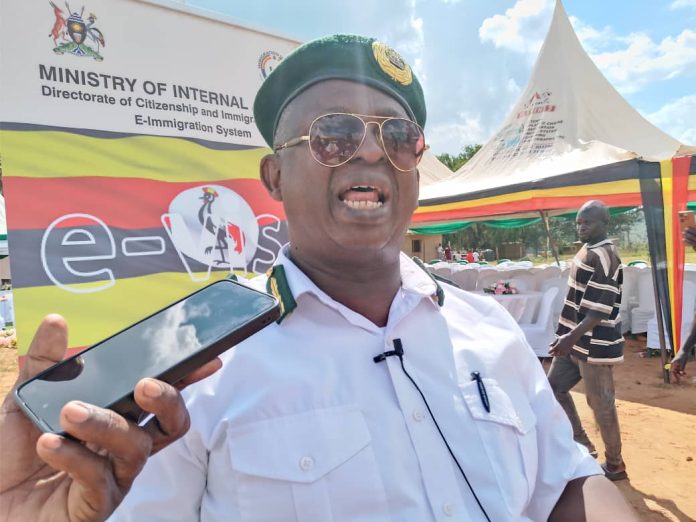|
Getting your Trinity Audio player ready...
|
The Ministry of Internal Affairs, through the Directorate of Citizenship and Immigration Control, has conducted diplomatic and stakeholder engagements in Greater Nebbi, aimed at empowering and enlightening local communities about how they can thrive, engage in cross-border trade, and coexist peacefully along the Uganda-DR Congo border while adhering to international law and bilateral agreements.
The sensitization program also seeks to establish strategic partnerships with relevant actors at the local level to maximize conflict mitigation opportunities, simultaneously enhancing cross-border access to economic and social opportunities through improved border management and secure cross-border mobility.
The constructive bilateral meeting, held at Oturgang Boys Primary School playground in Paidha Town Council, Zombo District, on Friday, October 24, 2025, convened local leaders, the business community, officials from Uganda’s Ministry of Internal Affairs, a delegation from the Democratic Republic of Congo (DRC), security personnel, and district officials from the three Greater Nebbi districts of Zombo, Nebbi, and Pakwach.
Mr. Marcelino Bwesigye, Assistant Commissioner for Borders and Foreign National Management, emphasized that the initiative aims to promote the socioeconomic transformation Uganda has achieved over the years, underscoring the importance of safeguarding peace, unity, and security as a priority in bilateral relations.
“We are here to plot how to protect the gains. It’s to help everyone to transform and progress,” Bwesigye stated, highlighting the longstanding interdependence between Uganda and the DRC, leveraging organized trade and peace to foster holistic development within the framework of regional cooperation.
Commissioner Bwesigye urged local communities to comply with the legal frameworks of both states. “At the center of all this is a local person,” he said, commending the DRC delegation for their significant participation in fostering peaceful coexistence and bilateral cooperation.
“You people make sure you have your Identity card, when you want to cross from Uganda to DR Congo, make sure you have a passport, and when you receive business partners from DR Congo, ensure they have legal documents,” he told the gathering, adding, “the government has the duty to protect you, but you need to also protect yourself.”
He lauded the DRC for their cooperative approach and called for a sustained spirit of bilateral collaboration.
According to Bwesigye, “there is greater realization that the geolocation of Uganda makes it a hub for mobility within the region. Whichever way you come across, you have to pass through Uganda to access, especially the DRC, which is one of the bigger markets within the region.
Now, presently the DRC is Uganda’s largest trading partner. But there are bottlenecks. We are not as big as we should be because our people are not doing formal business. So if we are going to grow bigger, we have to be better organized. We have to go for more. And this works for both Congo and Uganda.”
This meeting is timely in equipping millions of citizens along the territorial boundaries of Uganda and the DRC, many of whom lack basic knowledge of the legal frameworks governing cross-border activities, which often leads to violations of international and national laws.
Bwesigye noted, “It is the wish of the government and the desire for the leadership to make sure that many people are involved, and there is no other way except to formalize and to mobilize people. So this is an effort to mobilize as many people as possible to get involved in trade, in production, and in legal migration in a dignified and humane way.”
During the engagement, Elizabeth Emili, from the Directorate’s Department of Inspection and Enforcement, elaborated on the department’s mandate, which includes “inspect, arrest, investigate, detain, remove, and handle aspects of human trafficking and high-profile cases” in line with national and regional security frameworks.
Emili urged youths along the border, including refugees, to adhere to the legal and regulatory frameworks of both Uganda and the DRC.
Mozes Muhairwe, from the National Citizenship and Immigration Control, tasked with facilitating and regulating cross-border movement, emphasized, “This is a cross-border engagement because here is a long DR Congo border.”
He urged foreigners, particularly from the DRC residing in Uganda illegally, to register legally to “have rights to stay, work, and move freely in Uganda,” highlighting the benefits of compliance, including access to education, health, and security services.
The Directorate facilitates the legal and orderly movement of persons to and from Uganda, regulates the residence of immigrants, and enforces national and regional immigration laws to promote development and security in line with Uganda’s international commitments.
Festus Ayikobua, Zombo’s Resident District Commissioner, commended the Directorate for initiating this meeting to promote peace and security without disrupting social services, emphasizing the principles of Pan-Africanism and non-interference in sovereign affairs.
Ayikobua called for respect for gazetted border areas to prevent infringement and urged immigration authorities to deploy officers to multiple gazetted points to curb illegal utilization of porous borders. He also advocated for continuous sensitization and bilateral collaboration, urging the public to work with leaders and authorities to promote peaceful coexistence and prosperous unity.
“What we are doing today is the manifesto of NRM that is taking services nearer to the people without having challenges,” Ayikobua said, emphasizing adherence to legal frameworks over individual interests.
Congolese Delegation
The DRC delegation pledged to strengthen cooperation to ensure that trade, security, and peaceful coexistence advance smoothly, reinforcing the bilateral relationship between the two nations.
Mr. Mande Kivunganyi, Inspector Custom Officer from the DRC delegation, lauded the constructive engagement, assuring that “we must ensure peace, security, unity continue such our trade and the spirit of East African Community prosper.”
Abubakar Katende, Inspector Migration from the DRC delegation, urged Ugandan authorities to establish additional immigration offices along the border, noting that the absence of such facilities creates challenges for timely service delivery.
Katende also called for addressing cross-border territorial disputes, particularly over land, which strain bilateral relations critical for trade.
In response to the lack of immigration offices, Bwesigye urged leaders to sensitize communities on the benefits of legal cross-border movement. “It is only allowed that you go through a gazetted point. So, number one, we have to sensitize people to know that this is another country, although your other family is the other side, it’s another country, you have to go through a formal border,” he said.
Fred Onenarach, chairperson of Zombo District Boda Boda Association, praised the Directorate’s initiative, noting, “We face a lot of challenges like constant mounting of roadblocks, charges, etc., in DR Congo. We hope since all these leaders were here, this meeting will change their mindset.”
The program sensitized various groups, including Boda Boda associations, students, youth in border communities, local leaders, and border agencies, on issues hindering regular cross-border movements and threats linked to irregular activities such as smuggling and trafficking.
To bring services closer to the people, the Directorate operates 53 gazetted ports of entry/exit, 11 regional offices, and seven embassies abroad, with the West Nile regional office located in Arua City offering e-services.
Officials are optimistic that this sensitization will foster joint stakeholder approaches to legal cross-border trade, promote best practices in border management, and address threats related to smuggling and trafficking, particularly among vulnerable groups such as youth.
Greater Nebbi is endowed with major border points like Goli and Padea one-stop border posts, alongside minor crossing points. The sensitization aims to mitigate the negative effects of migration, enhance access to livelihood opportunities for young people, and increase collaboration among border stakeholders.
In 2024, the governments of Uganda and the DRC held a significant joint technical committee meeting in Goma, DRC, to reaffirm their shared border, develop a comprehensive roadmap, and allocate resources for demarcating the 817-kilometer boundary.
Uganda’s government continues to play a pivotal role in fostering diplomatic engagements with the DRC, which are critical for maintaining peaceful bilateral relations and achieving clear border demarcation.
According to Uganda’s Ministry of Foreign Affairs, only 44.8 kilometers of the border have been reaffirmed to date, including a 28-kilometer stretch from Offo/Vura and a 16.8-kilometer section from Sarambwe/Bwindi, underscoring the ongoing challenge of fully demarcating the border.



